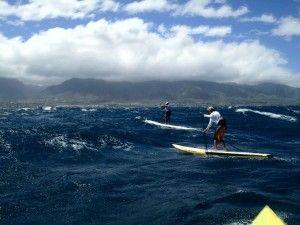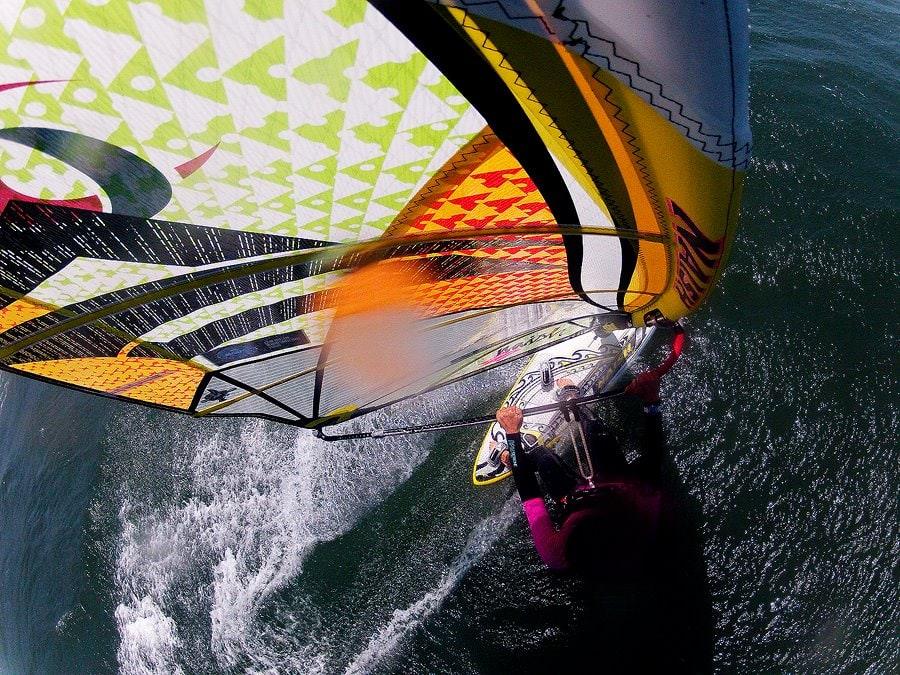
BUILD YOUR OPEN OCEAN ENDURANCE
Anytime you venture into the ocean, your open ocean endurance is not something to take for granted. It is a required physical and mental element that all water sport enthusiasts must have, especially when faced with huge walls of water moving and changing conditions. Besides navigating current changes, surface wind speeds, waves or deep troughs, often experienced and non-experienced folks alike can get into serious trouble or lose critical momentum needed to paddle through some of the roughest patches that can form underneath you, near you, in front of you or behind you.
This article is for you whether you’re a prone paddler, surfer, kayak paddler, canoe paddler or stand up paddler. How will you react if you fall off your paddleboard on a big downwinder? How about if your canoe tips and you lose your paddle? How prepared are you really? Do you carry a waterproof pouch with your cell phone or better yet, a GPS unit? Do you have a regular cardio routine that includes intense bouts of intervals? Do you cross-train?
If you’re pausing to think about any of these questions, then it’s time you take inventory, learn all you can and implement it now.

Listen to Suzie’s Radio Segment
on Open Ocean Endurance.
The Physical Part:
- Equipment Check: Check the integrity of your leash, tighten all fins, repair any major dings, tighten drain plugs, charge and take your cell phone, fill your Camelback, pack extra energy gel, bring a waterproof whistle, wear sun protection, and if you’re in a one-man canoe, strap on an extra paddle.
- Fuel: Charging the ocean requires food in your belly and hydration to reduce cramping. I like to suggest oatmeal or any complex carb at least an hour before departure. Another great fuel up is two pieces of a nutty whole grain bread with a protein spread like almond butter or low salt peanut butter. Coconut water is a favorite hydrator of mine because it offers lots of potassium, which allows you to hydrate more quickly. I also squirt back a full pack of energy gel before a long Maliko run. I avoid caffeine or super charged sugary drinks because these can actually dehydrate you and cause your energy to crash hard.
- Body: Strength, stamina and cardio, and more intense cardio. The biggest thing I notice when training both sport-specific athletes and weekend water warriors is the lack of cardio and cross-training. It’s a common component that is often overlooked but is so important. Strength and body stamina takes time to build, but is necessary too. There are many formulas on how-to acheive these things that are based on your sport, your goals and your current level of fitness, so I can’t write one program to fit you all. You’ll have to come train with me for your specialized program.
For example, stand up paddling, compared to a one-man canoe adventure, out of Maliko is an entirely different “physical” game and effort. Not to say you don’t use some of the same muscles, but it’s a different thwart of body endurance. Standing and paddling vs. sitting and paddling are two very different animals. Both require major body endurance, but because a canoe paddler is lower into the wind versus someone standing into the wind, you spend different amounts of energy at different times to get up and into the proper line. It’s all crazy hard and you are always expending a huge amount of energy, going all out to get out into open ocean, until you finally reach the point where you can turn down and begin the run. I tell people: No rest allowed. Go steady, dig in, head down and breathe.
Are you gasping for air? Did you drink too much the night before, causing you to be dehydrated and sluggish? Step up your game. Get on a spin bike, go for a run, do sprints and do them often. Incorporate a regular weight training routine into your workouts, and of course, it’s water time. Time in the boat or on your board is key, but mix that up as well.
The Maui Canoe and Kayak Club (MCKC) hosts a racing series with paddlers from Novice to Elite competing against one another from January – April. With a variety of skill levels on the water, ocean endurance is very important and is often overlooked among paddlers. Water conditions may change instantly and paddling on a lake is much different then paddling on the ocean. To improve your skills, and increase your safety, reading the waves and understanding the ocean should be a part of your training program. Many paddlers cut the shoreline too close and flip over in waves or damage their water craft. Paddlers must know their own skill level and check the water conditions prior to entering the ocean.
Here are some ocean endurance safety tips from Stacie Thorlakson, MCKC Board President:
- Wear bright colors
- Wear a leash around your ankle
- Paddle with a friend
- Carry a whistle
- Bring a cell phone in a waterproof case
- Know your limits
- Inform a teammate of your planned course
- We all need to know our limitations…a great paddle is a safe journey!
The Mental Part:
Having a mental plan to keep you calm is mandatory. Knowing what to do and how to keep your wits about you so that you can manage the unexpected can save your life or someone else’s. Learn the area you’re in and become a weather expert to monitor changing conditions where you are paddling. Get CPR-certified and take a basic or advanced first aid course. Fear and/or the unexpected can paralyze you from acting and thinking quickly. Stop, think, amd take inventory of the situation. If you don’t feel right about a certain day where you think you may be in literally over your head, don’t go. Know your real abilities and work up to bigger conditions.
If you’re exploring a new spot, downwind run, or channel crossing, be sure you are in good, qualified company. Get to know the people you are paddling with and their true capabilities. Common sense rules. Egos can be left in the truck. Let someone you know when and where you are leaving from, and your expected time of completion.
Also, check out Clay Everline, M.D. and partners’ book on “Surf Survival”. This book is well written, informative and can save your life or the life of someone you know. Check out my surfer’s fitness photos, so you are well prepared for small and big surf.
And just a reminder that you can find me on the air every Tuesday on KNUI 900 AM @ 7:30am (HST) for my weekly Health & Fitness segment on Maui’s number one radio talk show, The Maui Breakfast Club. We are in our third year with Tom Blackburn Rodiguez and Kellie Pali. Tune in live on the web here: http://knui900.listen2myradio.com/
Aloha!
Suzie Cooney, CPT Naish Team SUP Rider and Owner of Suzie Trains Maui
Follow Suzie on Facebook: SuzieTrainsMaui
Photo credit: Jeremy Riggs

